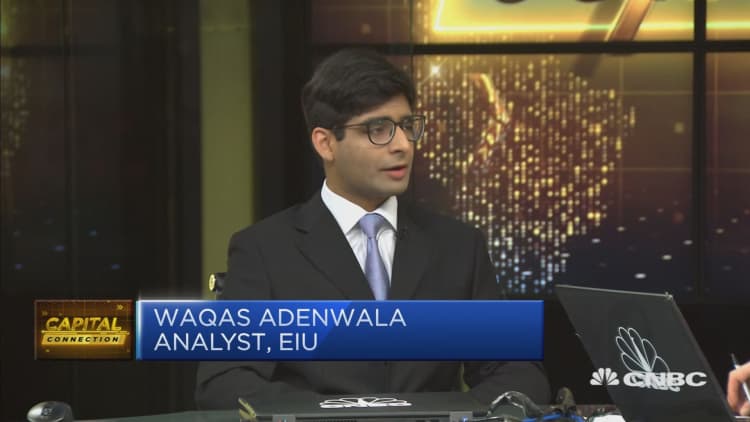Japanese Prime Minister Shinzo Abe is in Iran for a two-day mission with clear goals: to secure his country's energy supply, and to bring adversaries Iran and the U.S. to the negotiating table.
Both are challenging feats, and they require Abe — an ally of President Donald Trump and the first Japanese prime minister to visit Iran since its 1979 Islamic Revolution — to walk a thin tightrope between Japan's economic needs and its maintenance of geopolitical relationships.
Japan imports nearly all of its oil, and most of it from the Middle East, so sanctions on Iranian crude and potential instability in the region threaten its economy. But it also doesn't want to anger the U.S., its most powerful ally and security partner.
Abe is slated to meet with Iranian Supreme Leader Ayatollah Ali Khamenei and President Hassan Rouhani, and may well attempt to persuade them not to abandon the Iranian nuclear deal, from which the U.S. withdrew in May of last year. Trump gave Abe the green light for his visit, saying last month, "I know for a fact that the prime minister is very close with the leadership of Iran, and we'll see what happens. That would be fine."
Henry Rome, an Iran analyst and political risk consultancy Eurasia Group is skeptical of progress.
"While the meetings may help ease tensions in the short term, Abe will likely fail to convince Iranian leaders to negotiate directly or indirectly with Washington," he said in a research note Monday.

Economically cornered, Iranians still largely remain "firmly opposed" to talks with the Trump administration, Rome added. Trump has openly suggested talks with Iranian leaders, who criticize the U.S. for being insincere and engaging in what they describe as provocative escalation.
"As we have argued over the past year, the main barrier to talks between the US and Iran is Tehran," Rome said. "Abe has little shot at convincing Iranian leaders to abandon this policy." Khamenei has vocally urged against negotiating with Washington, stressing in recent speeches that to negotiate would mean "losing absolutely."
A clean slate: Japan's track record of diplomacy
Tensions have escalated rapidly between Tehran and Washington after the White House blamed a number of regional attacks in recent weeks on Iran. The U.S. is deploying additional military hardware and troops to the Gulf region while economic sanctions have crippled parts of Iran's economy, including oil exports.
Trump withdrew from the 2015 Iranian nuclear deal in May of last year and has been tightening sanctions on the country ever since. Now that Iran sees dwindling benefit to the deal that was supposed to give it economic relief in exchange for limits to its nuclear program, it has threatened to return to higher levels of uranium enrichment, sparking acute concern across the international community.
In addition to pursuing some sort of path to de-escalation, Abe seeks to showcase Japan's diplomatic influence on the world stage.
In 1983, Abe's father, then Japan's Foreign Minister Shintaro Abe, visited Tehran in an attempt to mediate between Iran and Iraq during the two countries' brutal war, and the younger Abe accompanied him as a secretary. Iran and Japan have a long history of cooperation, even during that war against the U.S.'s wishes — meaning it has something of a clean slate diplomatically.
The ball for negotiations in Iran's court?
There are obvious economic interests too. Oil makes up 97% of Japan's imports from Iran, according to the Japanese finance ministry. But Iranian crude made up only 4% of Japan's total oil imports last year, dwarfed by imports from Saudi Arabia, the United Arab Emirates and Qatar. Market forecasters expect Japan to fully cease its Iran imports as required by U.S. sanctions.
Still, the energy dynamic remains a part of Abe's outreach. Tokyo's considerations include "its own energy policy, stability in the region, a diversified source of oil imports," Waqas Adenwala, an analyst at the Economist Intelligence Unit, told CNBC's Capital Connection on Wednesday.
"But it also has the short-term goal of having a very successful foreign policy page front."
By that measure, Adenwala said, Abe hopes to boost support at home ahead of his hosting of the G20 Summit in Osaka at the end of June and parliamentary elections scheduled for late July.
And despite Tehran's apparent unwillingness to engage with the White House, "Iran does want to lower tensions with the US," Rome said. "It has little to lose by engaging with Abe."
Correction: A photo caption in this report has been updated to remove an incorrect reference to the day when the USS Abraham Lincoln sailed through the Strait of Hormuz.


